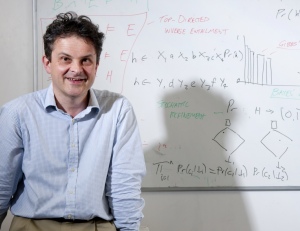Imperial's Vice-Provost lends AI expertise to the House of Commons

Professor Nick Jennings, Vice-Provost (Research)
Helping doctors to improve patient-care is one example of how artificial intelligence could help us, an Imperial expert told a select committee.
Professor Nick Jennings, Vice-Provost (Research) gave evidence to the Commons Science and Technology Committee as part of an inquiry into Robotics and Artificial Intelligence (AI).
Some MPs and scientists have outlined a scary future for AI. Our efforts were in part to inject a bit more realism into this ongoing dialogue
– Professor Nick Jennings
Vice-Provost (Research)
Speaking at an evidence gathering session on Tuesday 24 May, Professor Jennings set out how artificial intelligence and machine learning are currently affecting our everyday lives, and the potential for such technology to transform public services and bring economic benefit in the future.
Professor Jennings is an internationally-recognised authority in a range of scientific fields including artificial intelligence, autonomous systems and cyber security.
Professor Jennings said: “The algorithms that recommend new friends to you on Facebook and provide personal assistant services on your smartphones are just some of the AI technologies that are currently in existence. However, this is just the tip of the iceberg and we may see the technologies behind AI evolve exponentially in the future.”
The ability for AI to crunch large data sets is one of the major advantages of this technology, Professor Jennings told MPs. He also spoke about the possibility of AI to further enhance society’s medical capabilities.
Professor Jennings explained: “A major benefit could be in healthcare. A doctor will never be replaced, but AI could be on hand to process patient data and provide useful support and advice, helping to plot a complex surgical procedure to improve patient outcomes.”
Advances in medical research are leading to an information explosion that needs to be intelligently managed if the benefits are to be properly exploited. Professor Jennings said AI could analyse huge swathes of data, providing doctors with more options and advice for assessing and treating patients.
Professor Jennings added: “Some MPs and scientists have outlined a scary future for AI. Our efforts were in part to inject a bit more realism into this ongoing dialogue and also tell MPs about some of the benefits to healthcare and a range of other fields that this technology could bring to the UK.”
The committee also took evidence from various experts on current and future developments in robotics and artificial intelligence, including Professor Stephen Muggleton, Royal Academy Chair in Machine Learning in Imperial’s Department of Computing.
Professor Muggleton is a world-leading expert in the field of machine learning. This is where algorithms developed by researchers give computers the ability to learn without being explicitly programmed. In one major project, Professor Muggleton and his team, working with the agricultural company Syngenta, have developed a computing tool for predicting how plants will react to different environmental conditions in order to create better crops.

Professor Stephen Muggleton
As part of his evidence, Professor Muggleton was asked by committee members to help them to understand where improvements could be made to AI. The Imperial academic said that the ability of AI to communicate was a major technological hurdle that needs to be overcome, so that interactions between humans and AI can more nuanced, useful and beneficial.
Professor Muggleton said: “Developing AI in the future will be a major challenge involving researchers from across the board. Imperial is really well placed to be at the forefront of this field, with many research groups already pushing forward research in a range of different areas.
“There have been some scary predictions made about AI. However, it is a powerful technology that could really benefit humanity. We hope that our evidence at the Commons Select Committee brought more clarity to this area of research.”
Article text (excluding photos or graphics) © Imperial College London.
Photos and graphics subject to third party copyright used with permission or © Imperial College London.
Reporter
Deborah Evanson
Communications Division
Colin Smith
Communications and Public Affairs